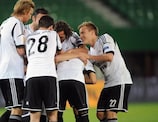Neftçi aiming for historic win at Rubin
Monday, October 15, 2012
Article summary
FC Rubin Kazan and Neftçi PFK meet for the first time in more than three decades with the Azerbaijani side looking to become the first ever visitors to win a group stage game in Tartarstan.
Article top media content

Article body
FC Rubin Kazan have yet to lose a home game in a UEFA group stage as they take on one-time domestic rivals Neftçi PFK for the first time in 36 years in UEFA Europa League Group H.
Previous meetings
• This is the sides' first competitive European meeting and Rubin's first UEFA encounter with a club from Azerbaijan.
• Neftçi's only European experience of Russian opposition was a 2004/05 UEFA Champions League second qualifying round tie against PFC CSKA Moskva. They drew the first leg 0-0 in Baku but lost the return fixture 2-0 in Moscow.
• The clubs both played in the same league system in the days of the former Soviet Union, but while Rubin never played in the top division, Neftçi spent a total of 28 seasons there, finishing as runners-up in 1976 – the best ever result for an Azerbaijani team in the USSR.
• Neftçi and Rubin met four times in the second tier of the Soviet system in 1975 and 1976. The Azeri side enjoyed the better of the exchanges, with a record reading W3 D1 L0 (W2 D0 L0 at home – W1 D1 L0 in Kazan). Neftçi beat Rubin 5-2 (13 June 1975) and 4-2 (8 Setember 1976) in Baku, drew 1-1 in Kazan on 5 May 1975, and won 2-1 in their most recent visit on 24 May 1976.
• Since the break-up of the USSR, Neftçi have played four games against Russian clubs in the friendly Commonwealth Cup, which brought together the champions of the former Soviet nations. They lost all four, but the results improved with time: they lost 8-0 to FC Spartak Moskva in the 1993 edition, and met the same opponents in 1995 and 1997, losing 5-0 and then 4-2. Most recently, they met FC Lokomotiv Moskva in the 2005 final, losing 2-1.
Match background
• Neftçi's 3-1 home defeat by FC Internazionale Milano on matchday two was their heaviest in Baku in this competition, and matched their worst ever European home loss, 2-0 against RTS Widzew Łódź in the 1997/98 UEFA Champions League first qualifying round.
• Rubin have lost only once in their last seven European home games – 1-0 against Olympiacos FC in last season's UEFA Europa League round of 32. They have yet to lose in ten UEFA group stage home games, recording four wins and six draws.
• Neftçi's four European away games this season have ended W1 D2 L1. Their 0-0 draw at FK Partizan on matchday one produced a first clean sheet on their travels in Europe in what was their 19th European away fixture.
Team facts
• Rubin are within three goals of their 50th in UEFA club competition – this is their 43rd European game.
• Neftçi's Uzbek striker Bakhodir Nasimov joined the club from Rubin in 2011 following a successful loan spell. He played in just two league games for the Russian side following his move to Rubin from FK Dinamo Samarqand in February 2010.
• Neftçi defenders Igor Mitreski (FC Spartak Moskva) and Mahir Shukurov (FC Anji Makhachkala) have also played in Russia.
• Kurban Berdyev has been coach of Rubin since 2001, leading the club to successive titles in 2008 and 2009 and a Russian Cup in 2012. Previously a defender and midfielder in the top Soviet league with SKA Rostov-na-Donu and FC Kairat Almaty, he coached teams in Russia, Turkey, Turkmenistan and Kazakhstan before leading Rubin into Russia's top division.
• Boyukagha Hajiyev is the coach of Neftçi. A coach and player at now-defunct MFK Araz-Naxçivan, he spent several years coaching in Iran and was Vagif Sadygov's assistant with the national team in 2005. Having won a first national title in what was initially a caretaker spell FK Bakı in 2005/06, Hajiyev won the crown again in 2011/12, his first season at Neftçi.
• This is FARE Action Week, with UEFA giving its support to Europe's biggest anti-discrimination campaign. There are activities before each UEFA Champions League and UEFA Europa League game which will be witnessed by thousands of fans in the stadiums and millions on television. A 30-second RESPECT TV spot and announcements over stadium loudspeakers will encourage fans to join the UEFA family in its call to unite against racism in football. Every team will be accompanied on to the pitch by children wearing Unite Against Racism T-shirts and captains will be asked to wear a Unite Against Racism armband.
















